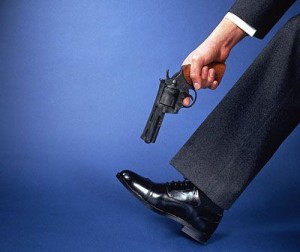Why It Is a Really Bad Idea to Use Litigation as a Means to Discover Defamation
I get this type of call perhaps twice a week, so I decided to post this article, in order to provide detailed information to prospective clients who bring up these issues.
Here is the scenario. The caller is convinced that he is being slandered, but does not know exactly what is being said. He may know who is making the statements, but has heard only rumors about what is being said, or has witnessed only the consequences of the statements. Often the issue will arise in the workplace, where because of the statements of a co-worker, the caller is being passed over for promotions, or perhaps was terminated because of those statements. Other times it might be a neighborhood situation, where the caller feels he is being shunned by neighbors and has reason to believe it is because of something said at an HOA meeting.
The problem with this sort of case is that you can’t determine if you are being defamed until you know what is being said. The consequence of a false statement can be severe, but that does not mean the statement is defamatory. For example, you might be entirely correct that you are being passed over for promotions because of something being said by a co-worker, but that co-worker might simply be saying that you are lazy and should not be promoted. That statement is not defamatory, because it is an opinion. Defamation can be very nuanced, and whether a statement is defamatory can come down to a single word or even the voice inflection used.
Before I can take a case, I have to know what was said. In cases where the prospective client does not have direct evidence of what is being said, I have a simple screening process. The prospective client must provide me with at least one, but preferably two, written statements from witnesses, attesting to: (1) what was said; (2) when it was said; (3) who said it; (4) who was present; (5) whether the witness believed what was said; and (6) what effect the statement had on the witness.
The act of gathering the witness statements is a very effective screening process for two reasons. First, I have to know what was said to even know if the facts support a defamation action, so the statements provide that information. Secondly, if no one is willing to provide a written statement, then we know we will have no volunteer witnesses if the matter goes to trial.
I know that when I provide the caller this homework assignment, it may be impossible to complete. People love to pass along gossip, but those same people who take so much glee in rumor-mongering will refuse to sign a statement because they are not willing to commit to what they are saying. Additionally, anyone who signs a written statement probably knows that they are going to be called as a witness, and will have to spend time being deposed and appearing at trial. It should come as no surprise that few want to volunteer for that duty. Nonetheless, the act of seeking out the written statements is essential because it gives us the definitive answer as to whether the case can be pursued. You cannot win a slander case if no one will testify to what was said.
Understandably, the callers are not happy with this impossible homework assignment, and look for ways to get around it. Most often, they suggest that we should file the action without any witnesses in place, and then use the subpoena process to get the necessary statements. I have no doubt that any number of attorneys will happily take the client’s money and pursue such a course, but it is a truly horrible idea in most cases. A plaintiff who relies on only forced witnesses has almost no chance of prevailing.
I understand the logic of the callers. When the deposition of a witness is taken, they are supposed to answer truthfully, and finding out what was said should be a simple matter of putting the people under oath and asking them what they heard. Sadly, to most people the oath to tell the truth has little meaning. If they feel that telling the truth will put their jobs in jeopardy, for example, they will lie. Even if they don’t lie, if you made them appear involuntarily, they will shade the truth so much that it will be useless. “I remember Dave said something about the Plaintiff, but I really don’t remember what it was, and I figured he was just trying to be funny.”
Making matters worse are the anti-SLAPP statutes. If you don’t know what a SLAPP is, go to the anti-SLAPP explanation after you finish reading this article. Under the anti-SLAPP statute, a defendant can file a motion that freezes all discovery and forces the plaintiff to put on his case with only the evidence he has at that moment (although you can seek relief). Thus, the plaintiff can be in a position where he filed the action hoping to conduct discovery, but is then prevented from conducting that discovery. If he has insufficient evidence to prove the case, he will then be ordered to pay the attorney fees incurred by the defendant. Unfortunately, some courts routinely rubber-stamp these inflated fee requests, and attorney fees awards of $100,000 are not uncommon.
Not every wrong has a remedy. Murders go unsolved, and although you are sure you are being slandered, you may never be able to determine what it is that was said. If you don’t have a witness willing to testify, it is a huge risk to pursue an action, hoping you will be able to find one through discovery, and that what they report will be defamatory.



